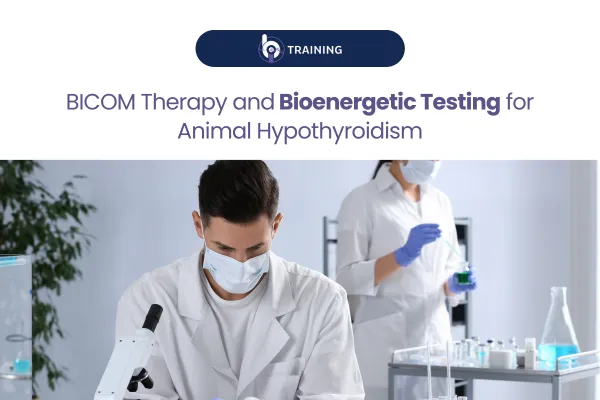
BICOM Therapy and Bioenergetic Testing for Animal Hypothyroidism
BICOM Therapy and Bioenergetic Testing for Animal Hypothyroidism
When your dog or horse begins to slow down, gain weight without explanation, or develop a dull, thinning coat, it’s easy to think they are just getting older. However, these subtle changes can sometimes point to a deeper issue – thyroid imbalance. For many pets, hypothyroidism can go unnoticed until it affects energy, mood, and overall well-being. But what if there was a way to detect underlying triggers early and support recovery naturally? This is where BICOM therapy for pets and advanced bioenergetic diagnostics for animals step in.
Conventional testing methods focus mainly on hormone levels. While this is important, it often overlooks environmental, dietary, and energetic stressors that contribute to thyroid dysfunction. By combining bioenergetic testing with BICOM therapy, pet owners and vets gain a deeper understanding of what’s truly going on inside the body – and how to restore balance.
Understanding Hypothyroidism in Animals
Hypothyroidism is a condition where the thyroid gland produces too little hormone, slowing down metabolism. In dogs, it is often caused by autoimmune disease or gland atrophy, while in horses, it can be linked to nutritional imbalances, environmental toxins, or developmental issues in foals.
Symptoms can include:
Lethargy or low energy
Weight gain without increased food intake
Poor coat quality and hair loss
Sensitivity to cold
Behavioural changes such as irritability or unusual quietness
The challenge lies in pinpointing the root cause. Hormone imbalance is just one piece of the puzzle; the triggers can be hidden in diet, environment, or even chronic low-level infections.
How Bioenergetic Diagnostics Can Help
Bioenergetic diagnostics for animals is a non-invasive approach that uses advanced frequency testing to identify underlying stressors affecting the body. Instead of just looking at symptoms, it examines how energy flows through the animal’s body and detects blockages or disturbances that could be linked to thyroid function.
These tests can uncover:
Food sensitivities such as gluten sensitivity and animal thyroid health issues
Burdens from fungal and parasitic loads in pets
Accumulated heavy metals
Stress caused by environmental toxins affects thyroid function
The beauty of this method is that it can highlight imbalances before they show up on conventional tests, giving owners a chance to act early.
CTT and STT Veterinary Testing
Two advanced methods often used alongside BICOM therapy are CTT and STT veterinary testing.
CTT (Causative Testing Technique) helps identify the root cause of health issues by scanning for specific energetic imbalances.
STT (Systemic Testing Technique) focuses on how different body systems interact and affect each other.
When applied to pets with suspected hypothyroidism, these tests can reveal surprising connections. For instance, a dog’s low thyroid output could be linked to long-term exposure to lawn chemicals, or a horse’s sluggish metabolism might be traced back to mineral imbalances caused by contaminated feed.
The Role of Gluten Sensitivity in Animal Thyroid Health
In humans, gluten sensitivity is well-known to be linked to autoimmune thyroid disorders, and emerging research suggests animals may face similar risks. Undiagnosed gluten intolerance can cause inflammation that disrupts the immune system, sometimes leading to thyroid problems.
Through bioenergetic testing, gluten sensitivity and animal thyroid health connections can be identified. If gluten is found to be a trigger, adjusting the animal’s diet can help reduce inflammation and support thyroid recovery.
Addressing Fungal and Parasitic Loads in Pets
Low-level fungal infections or parasitic burdens can drain an animal’s immune system over time. Conditions such as yeast overgrowth or intestinal parasites may not always cause noticeable symptoms, but can still interfere with hormonal balance.
Identifying fungal and parasitic loads in pets through bioenergetic diagnostics means these issues can be addressed early, reducing stress on the thyroid and improving overall vitality.
Heavy Metal Detox in Dogs and Horses
Modern environments expose animals to a surprising amount of heavy metals – from contaminated water to industrial pollution. Lead, mercury, and cadmium can accumulate in the body, disrupting thyroid hormone production and damaging metabolic processes.
Heavy metal detox in dogs and horses can be part of a holistic treatment plan. BICOM therapy can help support the body’s natural detox pathways, while dietary adjustments and supplements can aid in the safe elimination of these harmful substances.
Environmental Toxins and Thyroid Function
Thyroid health can be affected by pesticides, herbicides, cleaning agents, and even air pollutants. These environmental toxins affecting thyroid function often go unnoticed because the symptoms develop gradually. Over time, these toxins can burden the liver, immune system, and endocrine system.
By identifying toxin exposure through bioenergetic testing, pet owners can make changes to reduce future risks – such as switching to chemical-free cleaning products, using natural pest control, and providing clean, filtered water.
What is BICOM Therapy for Pets?
BICOM therapy for pets is a form of bioresonance therapy that uses electromagnetic frequencies to detect and correct imbalances in the body. Each cell, organ, and system emits a unique frequency when healthy, and a different one when stressed or damaged.
The BICOM device reads these frequencies, identifies distortions, and then uses corrective signals to help the body restore balance. For pets with hypothyroidism, it can be used to:
Support thyroid gland function.
Reduce immune system stress.
Aid detoxification from heavy metals or toxins.
Improve nutrient absorption and metabolism.
Enhance overall energy and vitality.
The therapy is gentle, non-invasive, and painless – making it suitable for even sensitive animals.
Combining BICOM Therapy with Veterinary Care
While BICOM therapy offers a unique holistic approach, it should work alongside conventional veterinary diagnosis and treatment. Blood tests, imaging, and medical examinations remain vital for accurate diagnosis. The bioenergetic approach adds another layer of understanding, helping to address the underlying stressors rather than just the symptoms.
Many pet owners choose a combined approach: standard veterinary care for immediate hormone support, and BICOM therapy to work on detoxification, immune regulation, and long-term health maintenance.
Real-Life Impact of Bioenergetic Support
Imagine a middle-aged dog with low energy, weight gain, and patchy fur. Blood work shows low thyroid hormone, but medication alone doesn’t bring full improvement. Bioenergetic testing reveals gluten sensitivity, heavy metal accumulation, and a fungal load. By removing gluten from the diet, supporting detox pathways, and using BICOM therapy sessions, the dog’s coat shines again, energy returns, and reliance on higher medication doses decreases.
Similarly, a competition horse with poor performance might show no significant abnormalities on routine blood tests. Bioenergetic testing identifies pesticide exposure and mineral imbalances. Adjusting feed, detoxifying heavy metals, and applying BICOM therapy sessions can help restore strength and endurance.
The Process of Bioenergetic Testing and Therapy
Initial Assessment – Gathering full history, symptoms, and environmental exposure details.
Bioenergetic Scan – Using CTT or STT to detect energetic imbalances.
Analysis of Results – Identifying key stressors such as toxins, infections, and sensitivities.
Therapy Sessions – Using the BICOM device to help rebalance the body.
Follow-Up Testing – Monitoring progress and adjusting therapy as needed.
Most animals require a series of sessions for best results, with ongoing monitoring to ensure improvements are maintained.
Supporting Thyroid Health Naturally
Beyond therapy, lifestyle and environment play a significant role in thyroid wellness:
Provide balanced, high-quality nutrition free from allergens.
Reduce chemical exposure in the home and stable.
Ensure access to clean, fresh water.
Maintain regular exercise suited to the animal’s age and condition.
Schedule routine veterinary check-ups alongside holistic assessments.
FAQs
1. What is BICOM therapy for pets?
It is a bioresonance therapy using electromagnetic frequencies to detect and correct imbalances in animals.
2. Can bioenergetic diagnostics for animals replace vet tests?
No, it should complement traditional veterinary care, adding deeper insight into underlying stressors.
3. What is CTT veterinary testing?
Causative Testing Technique, which identifies root causes of health problems through energetic analysis.
4. What is STT veterinary testing?
Systemic Testing Technique, which examines how different body systems affect each other.
5. How is gluten sensitivity linked to animal thyroid health?
It can trigger inflammation and immune reactions that damage the thyroid gland.
